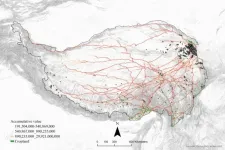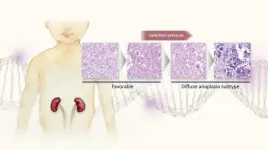(Press-News.org)
Do climate change deniers bend the facts to avoid having to modify their environmentally harmful behavior? Researchers from the University of Bonn and the Institute of Labor Economics (IZA) ran an online experiment involving 4,000 US adults, and found no evidence to support this idea. The authors of the study were themselves surprised by the results. Whether they are good or bad news for the fight against global heating remains to be seen. The study is being published in the journal Nature Climate Change. STRICTLY EMBARGOED: Do not publish before Friday, February 02, 11 a.m. CET!
A surprisingly large number of people still downplay the impact of climate change or deny that it is primarily a product of human activity. But why? One hypothesis is that these misconceptions are rooted in a specific form of self-deception, namely that people simply find it easier to live with their own climate failings if they do not believe that things will actually get all that bad. “We call this thought process ‘motivated reasoning,’” says Professor Florian Zimmermann, an economist at the University of Bonn and Research Director at IZA.
Motivated reasoning helps us to justify our behavior. For instance, someone who flies off on holiday several times a year can give themselves the excuse that the plane would still be taking off without them, or that just one flight will not make any difference, or—more to the point—that nobody has proven the existence of human-made climate change anyway. All these patterns of argument are examples of motivated reasoning. Bending the facts until it allows us to maintain a positive image of ourselves while maintaining our harmful behavior.
Self-deception to preserve a positive self-image
But what role does this form of self-deception play in how people think about climate change? Previously, there had been little scientific evidence produced to answer the question. The latest study has now closed this knowledge gap—and has thrown up some unexpected results. Zimmermann and his colleague Lasse Stötzer ran a series of online experiments, using a representative sample of 4,000 US adults.
At the center of the experiments was a donation worth $20. Participants were allocated at random to one of two groups. The members of the first group were able to split the $20 between two organizations, both of which were committed to combating climate change. By contrast, those in the second group could decide to keep the $20 for themselves instead of giving it away and would then actually receive the money at the end. “Anyone keeping hold of the donation needs to justify it to themselves,” says Zimmermann, who is also a member of the ECONtribute Cluster of Excellence, the Collaborative Research Center Transregio 224 and the Transdisciplinary Research Area “Individuals & Societies” at the University of Bonn. “One way to do that is to deny the existence of climate change.”
As it happened, nearly half of those in the second group decided to hold on to the money. The researchers now wanted to know whether these individuals would justify their decision retrospectively by repudiating climate change. The two groups had been put together at random. Without “motivated reasoning,” therefore, they should essentially share a similar attitude to human-made global heating. If those who kept the money for themselves justified their actions through self-deception, however, then their group should exhibit greater doubt over climate change. “Yet we didn’t see any sign of that effect,” Zimmermann reveals.
Climate change denial: a hallmark of one’s identity?
This finding was also borne out in two further experiments. “In other words, our study didn’t give us any indications that the widespread misconceptions regarding climate change are due to this kind of self-deception,” says Zimmermann, summing up his work. On the face of it, this is good news for policymakers, because the results could mean that it is indeed possible to correct climate change misconceptions, simply by providing comprehensive information. If people are bending reality, by contrast, then this approach is very much a non-starter.
Zimmermann advises to be cautious, however: “Our data does reveal some indications of a variant of motivated reasoning, specifically that denying the existence of human-made global heating forms part of the political identity of certain groups of people.” Put another way, some people may to an extent define themselves by the very fact that they do not believe in climate change. As far as they are concerned, this way of thinking is an important trait that sets them apart from other political groups, and thus they are likely to simply not care what researchers have to say on the topic.
Institutions involved and funding secured:
The University of Bonn and the Institute on Behaviour and Inequality (briq) were involved in the study. briq is now part of the Institute of Labor Economics (IZA). The work was funded by the German Research Foundation (DFG).
END
Scientists from the German Cancer Research Center (DKFZ) and Heidelberg University investigated in mice how spreading tumor cells behave at the site of metastasis: Some tumor cells immediately start to form metastases. Others leave the blood vessel and may then enter a long period of dormancy. What determines which path the cancer cells take is their epigenetic status. This was also confirmed in experiments with human tumor cells. The results of the study could pave the way for novel diagnostic and therapeutic applications.
What makes cancer so dangerous? ...
The 1 million-square-mile Tibetan Plateau — often called the “roof of the world” — is the highest landmass in the world, averaging 14,000 feet in altitude. Despite the extreme environment, humans have been permanent inhabitants there since prehistoric times.
Farming and herding play major roles in the economy of the Tibetan Plateau today — as they have throughout history. To make the most of a difficult environment, farmers, agropastoralists and mobile herders interact and move in conjunction with one another, which in turn shapes ...
World Wetlands Day: Bogs hold an important key to the climate crisis
Peat bogs store twice as much CO2 as all of the world's forests combined. A new research center at the University of Copenhagen will map Earth’s wetlands and provide important knowledge about the greenhouse gas budgets of these areas. The Global Wetland Center will teach us how to contain carbon from plants and trees in bogs and other wetlands – and preserve it as well as the ancient bog bodies also found there.
He is world-renowned ...
Researchers at the University of Auckland are running a trial of castor oil as a potential safe and natural treatment for dry-eye disease following a successful pilot study.
While exact figures aren’t available for New Zealand, in Australia, it is estimated dry-eye disease affects around 58 percent of the population aged over 50.
Advancing age, menopause, increased screen time, contact lens wear are just some of the risk factors for developing dry eye disease.
Blepharitis is the most common cause of dry-eye disease, accounting for more than 80 percent of cases. It is a chronic condition with no known cure.
“Currently, patients ...
In a study recently published in the PNAS on Jan. 30, a research team led by Prof. CAO Xiaofeng from the Institute of Genetics and Developmental Biology of the Chinese Academy of Sciences, in collaboration with researchers from the Southern University of Science and Technology, reported a new understanding of how light affects plant growth.
Light plays a central role in plant growth and development, providing an energy source and governing various aspects of plant morphology. Post-transcriptional splicing (PTS) has been previously discovered to generate polyadenylated full-length transcripts. These transcripts, ...
A group of patients with a hereditary disorder have had their lives transformed by a single treatment of a breakthrough gene-editing therapy, according to the lead researcher.
The patients from New Zealand, the Netherlands and the UK have hereditary angioedema, a genetic disorder characterised by severe, painful and unpredictable swelling attacks. These interfere with daily life and can affect airways and prove fatal.
Now researchers from the University of Auckland, Amsterdam University Medical Center and Cambridge University Hospitals have successfully treated more than ten patients with the CRISPR/Cas9 therapy, ...
A molecule created at the University of Auckland is one step closer to becoming a treatment for an extremely rare and severely debilitating neurological disorder called Phelan-McDermid syndrome. Children with the disorder showed significant improvements in a phase two clinical trial in the US, Neuren Pharmaceuticals, which is listed on the Australian Securities Exchange, said in December.
Next steps would be a phase three trial and seeking approval from the US Food & Drug Administration. The molecule, NNZ-2591, comes from work years ago ...
University of Queensland researchers have used machine learning to help predict the risk of secondary bacterial infections in hospitalised COVID-19 patients.
The machine learning technique can help detect whether antibiotic use is critical for patients with these infections.
Associate Professor Kirsty Short from the School of Chemistry and Molecular Biosciences said secondary bacterial infections can be extremely dangerous for those hospitalised with COVID-19.
“Estimates of the incidents of secondary bacterial infections in COVID-19 ...
An international team, led by researchers at Nagoya University in Japan, may have determined why the diffuse anaplasia (DA) subtype of Wilms tumor (WT) resists chemotherapy. This subtype grows even when it has a high burden of DNA damage and increases the mutation rate of tumor protein 53 (TP53), a gene that plays a critical role in the regulation of cell growth and division. The team’s findings, published in Modern Pathology, suggest new ways to treat this subtype.
WT, also known as nephroblastoma, is the most common childhood cancer originating in the kidney. Fortunately, the survival rate of adolescents ...
Disrupted function of “cleaning cells” in the body may help to explain why some people with obesity develop type 2 diabetes, while others do not. A study from the University of Gothenburg describes this newly discovered mechanism.
It is well known that obesity increases the risk of insulin resistance and type 2 diabetes. It is also well known that some people who gain weight suffer from the disease and others do not. The reasons for these differences are not clear, but they are related ...




